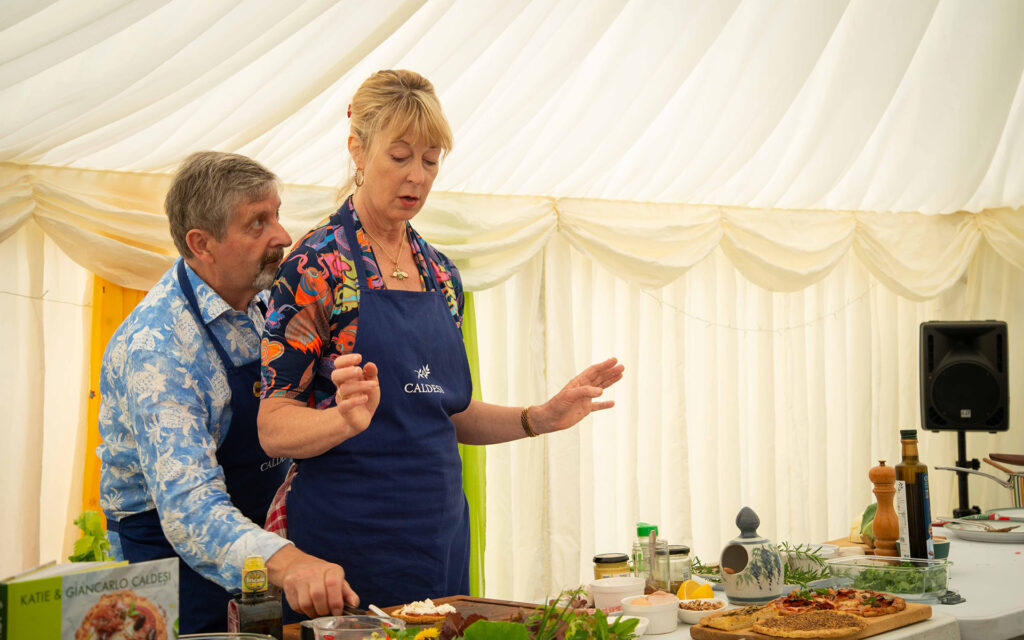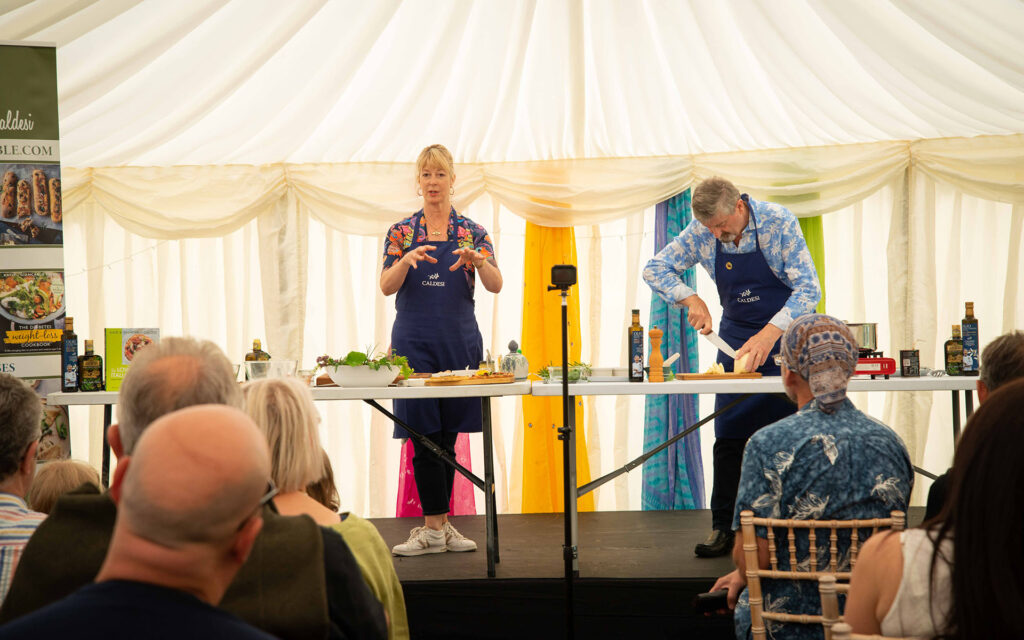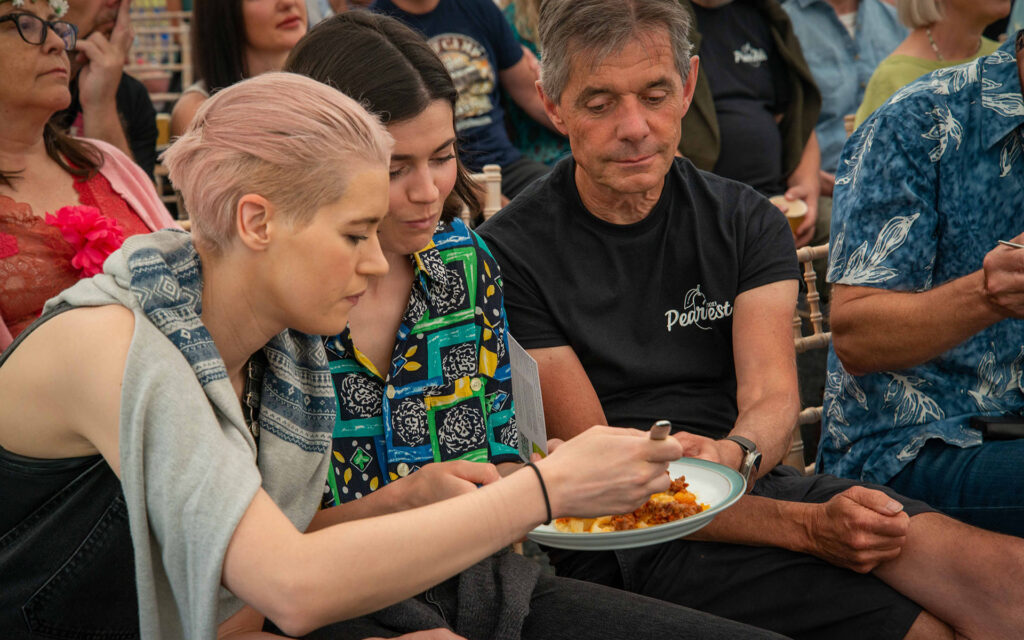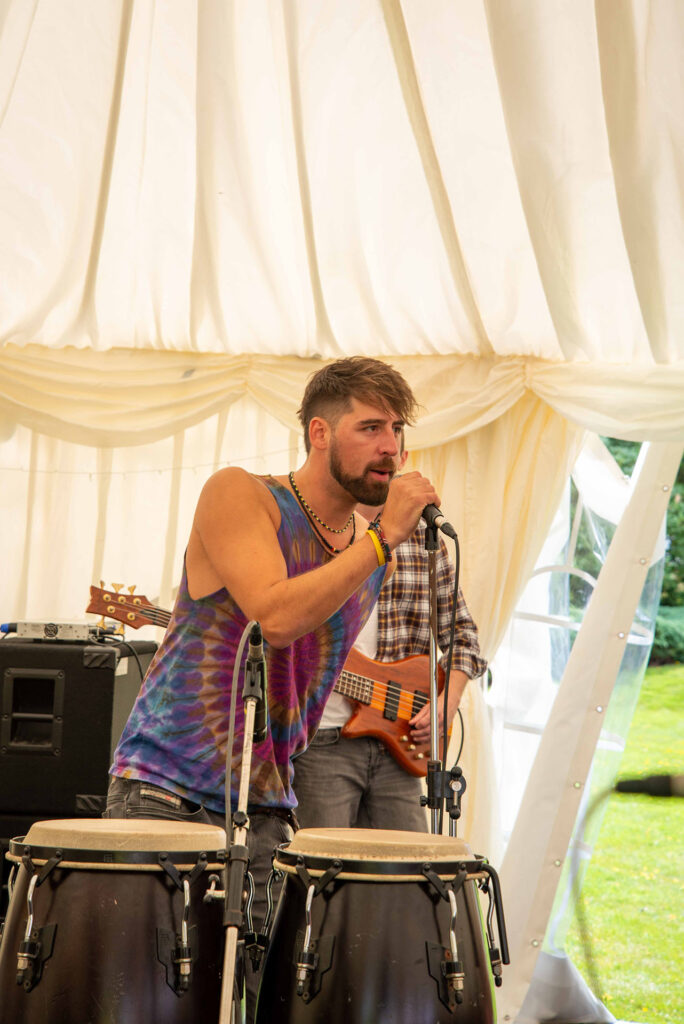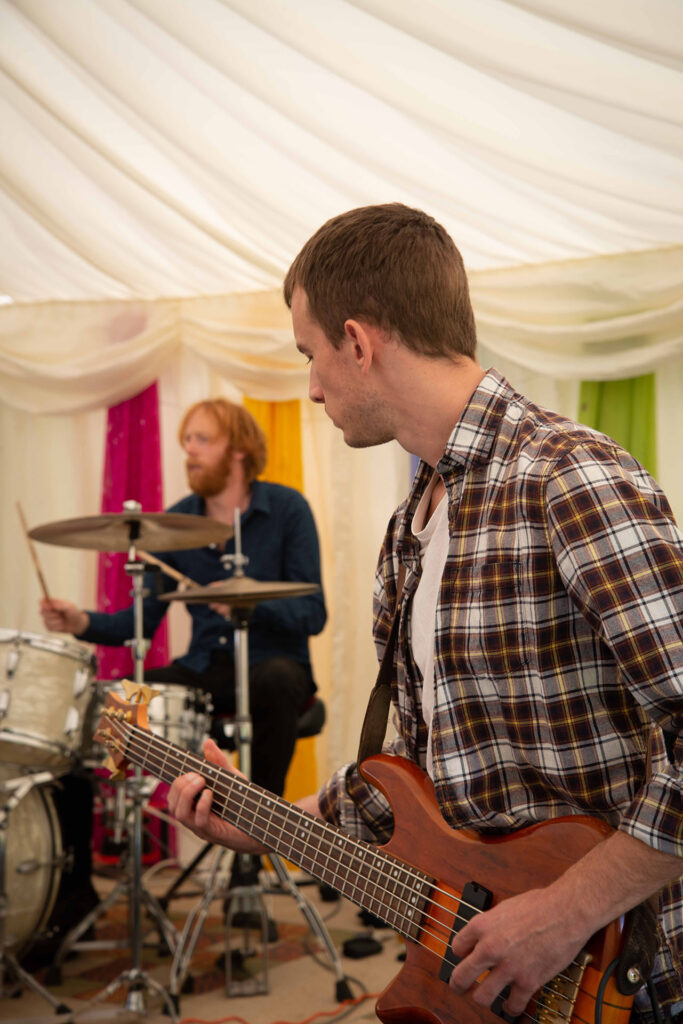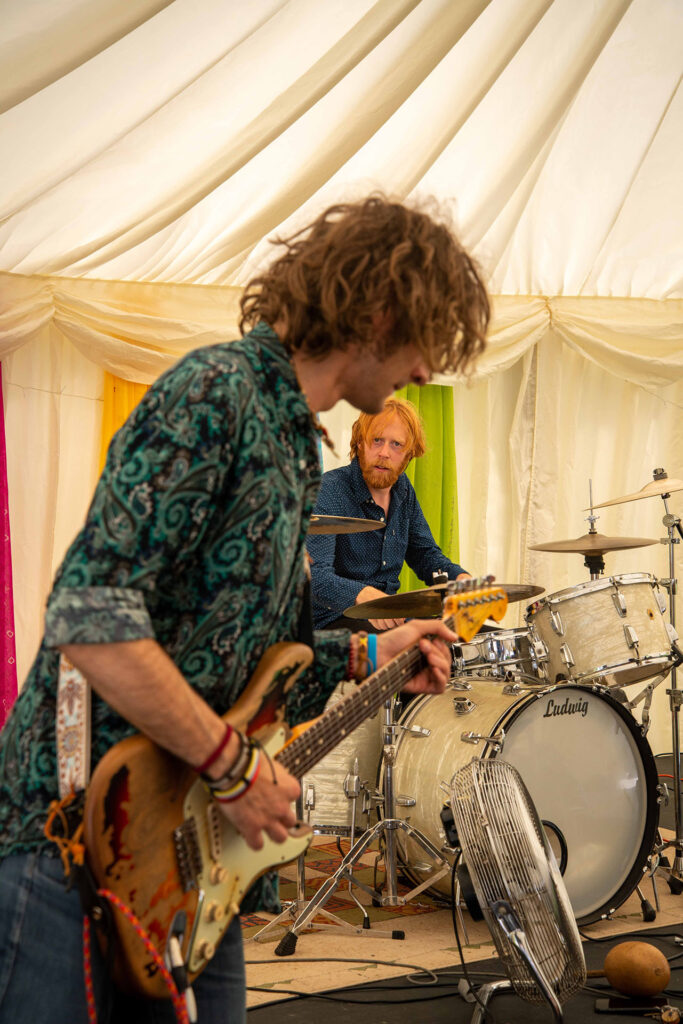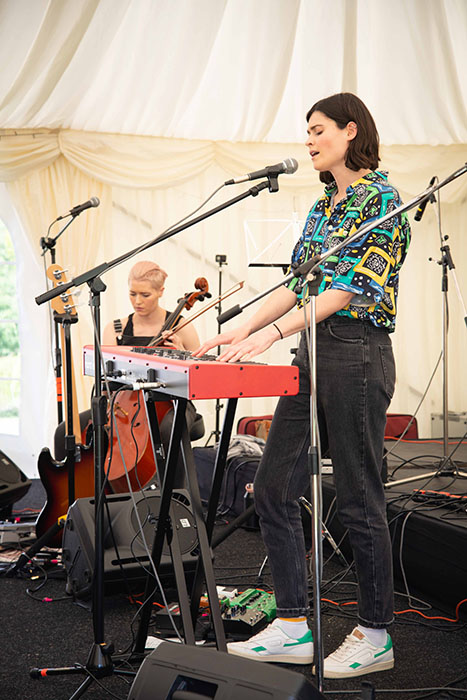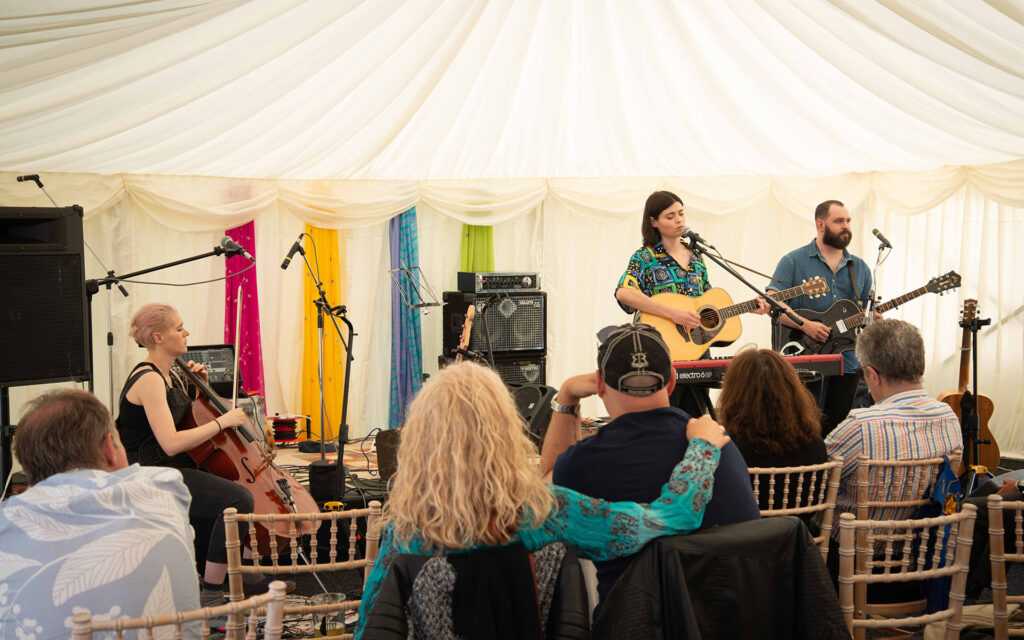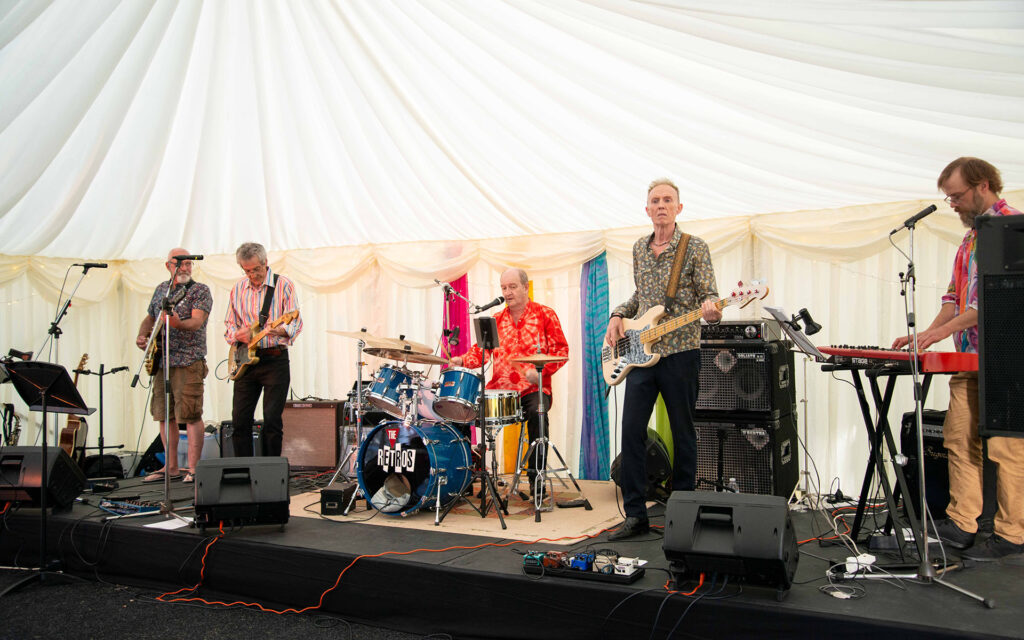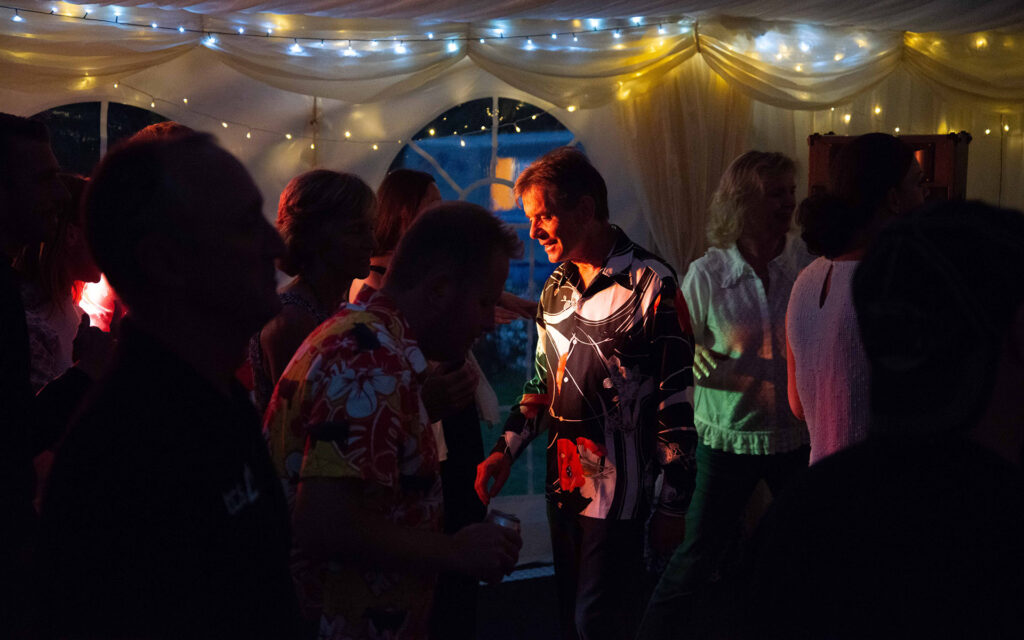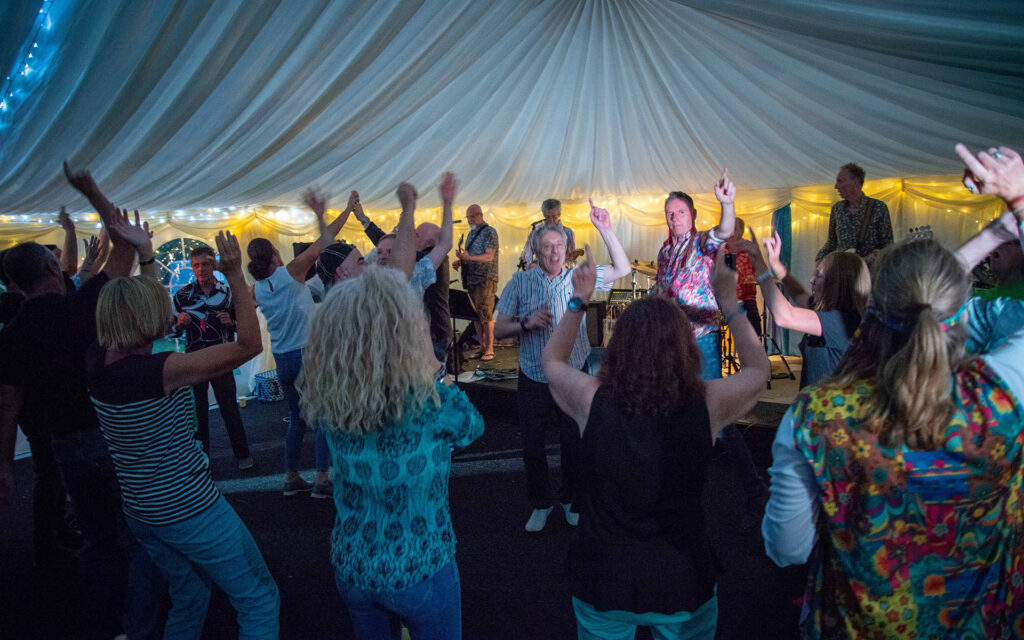Pear Fest 2023: Bridging the Gap Between Agriculture, Environment, and Health
In the lush landscapes of Worcestershire, Pear Fest 2023 heralded a pioneering symposium aptly themed ‘From Soil to Soul’, orchestrating a symphony of ideas at the intersection of sustainable agriculture, environmental mindfulness, and public health.
The festival curated a unique gathering, bringing together for the first time, innovative farmers, and forward-thinking doctors. This convergence was dedicated to unravelling and remedying the ecological maladies befalling our soil—maladies that precipitate nutrient-depleted produce and subsequent health decline.
Dr. Jenny Goodman: Advocating for Soil’s Role in Our Health and Future
Dr. Jenny Goodman, a prominent figure in the realms of nutrition and environmental medicine, opened the dialogue by drawing a compelling parallel between the vitality of soil and human health. In her session titled ‘From Soil to Soul’, she illuminated the critical synchronicity between a diverse soil microbiome and a robust human gut microbiome.
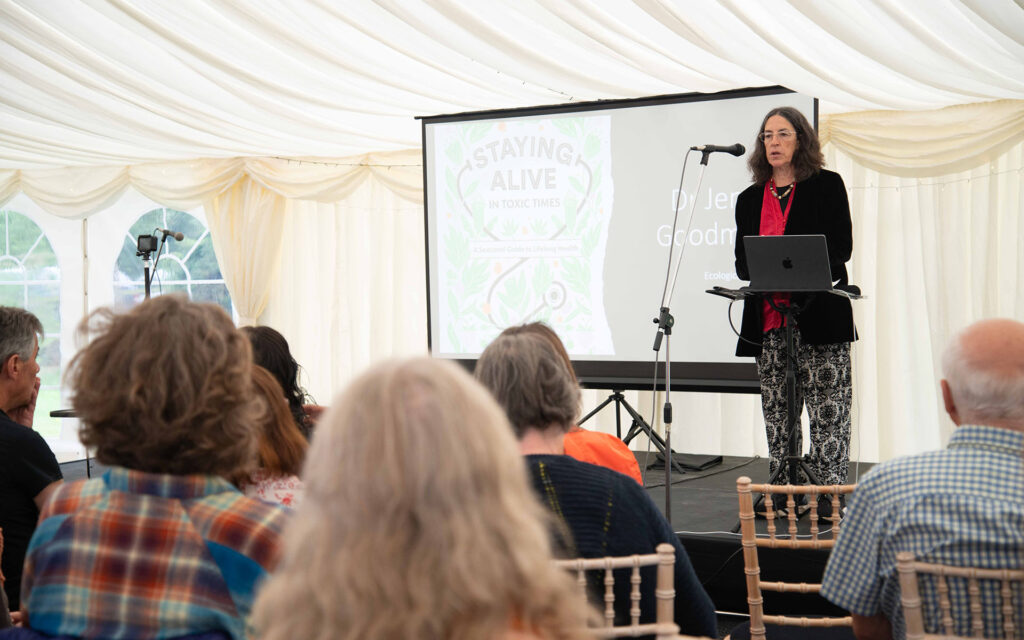
Dr. Goodman delved deep into the ramifications of 20th and 21st-century farming practices, elucidating how the reliance on monocultures has ensnared farmers in a relentless cycle of synthetic chemical usage, leading to degraded soil and subsequent ill health in crops and humans alike. She depicted a dire picture where the overuse of pesticides and other ‘cides’ not only obliterates pests but also decimates the beneficial soil microbiome, essential for the ecosystem’s balance.
Highlighting the cascade of consequences, Dr. Goodman explained that the lack of a rich variety of bugs and microbiota in the soil leads to crops devoid of essential minerals and fatty acids. She articulated the troubling dependency on fossil fuel-derived fertilizers, which provide only the bare minimum for plant survival, resulting in weakened cellular structures and, consequently, a nutrient-depleted human diet.
The vicious cycle of increasing ‘cide’ usage with each crop generation was laid bare by Dr. Goodman, underscoring the profound food and health crises we now face. Furthermore, she addressed the environmental catastrophe of eutrophication, detailing how mismanaged soil washes into waterways, creating lifeless zones and exacerbating the plight of aquatic life.
Regenerative farming, as Dr. Goodman and other speakers at the festival highlighted, offers a beacon of hope. It’s a practice that not only produces food but also rejuvenates the environment, particularly the soil. She outlined regenerative principles, such as planting diverse crops in close quarters, minimal soil disturbance, and utilizing cut weeds as mulch. Techniques like mob grazing and tree planting were also discussed as ways to foster a self-sustaining, biodiverse ecosystem.
Dr. Goodman’s message was clear: regenerative farming isn’t just a technique; it’s a direction toward healing the land. By embracing these methods, we can cultivate soils rich in nutrients and minerals, support a diverse array of wildlife, and yield crops that can fend off disease without chemical aid. Her talk underscored that by nourishing the earth, we are, in turn, nurturing our bodies and ensuring a healthier future for all.
Rebecca Hosking: From Wildlife Filmmaker to Shepherd of Regeneration
Rebecca Hosking delivered a poignant narrative that captivated the audience with her journey from acclaimed wildlife filmmaker to guardian of the land.
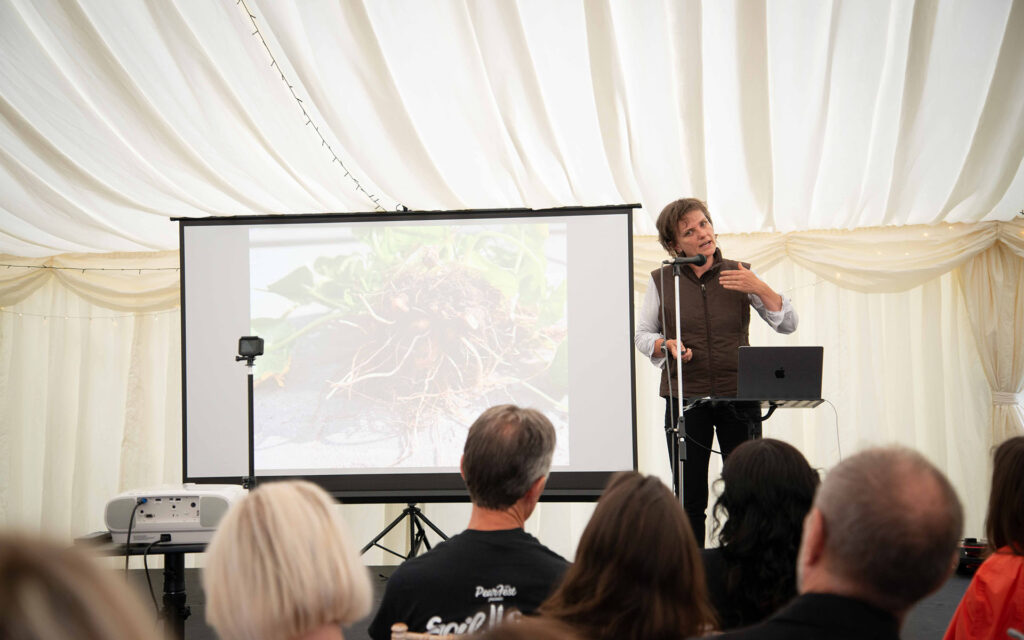
Hosking’s account was not just personal; it was a testament to conviction and change. With a childhood steeped in the knowledge of plant etymology, thanks to a botanist mother and wildlife photographer father, Rebecca’s path seemed almost destined to merge the worlds of ecological awareness and visual storytelling. Her career took flight with the BBC, where she worked alongside the legendary David Attenborough as a wildlife filmmaker, a role many would deem a pinnacle. Yet, after nine years of global exploration, the unseen realities of ecological destruction witnessed off-camera became a catalyst for change.
In a brave and bold move, Hosking, alongside her colleague Tim Green, stepped away from the lens to embark on a journey of direct action. They settled on a farm in Devon, championing regenerative farming methods to rear a diverse flock of heritage sheep. Tragedy struck with Green’s untimely death in 2017, prompting Rebecca to adapt once more, consolidating her flock to continue their care on her parents’ farm. Here, she practices a unique style of holistic planned grazing, fostering soil health and biodiversity.
Hosking’s sheep, a ‘forever flock’, provide fleece for rugs, with a craft that bridges traditional husbandry and modern sustainability. Her innovative techniques, including the concepts of ‘Solargrass’ and ‘Duvet cover’, have not only become buzzwords within the regenerative farming community but have also showcased how agriculture can symbiotically benefit the environment.
As if tending to her flock wasn’t demanding enough, Hosking dedicates her spare time to educating others about regenerative practices and documenting her life through film, continuing to influence and inspire a new generation of farmers and environmental stewards.
John Letts: Sowing the Seeds of the Past for the Future
Pear Fest 2023’s tapestry of thought-provoking speakers was further enriched by John Letts, an ancient grain farmer with a unique blend of expertise as an archaeo-botanist. His presentation at the festival was not only an exposition of his journey but also an exploration into the very roots of our agricultural heritage.
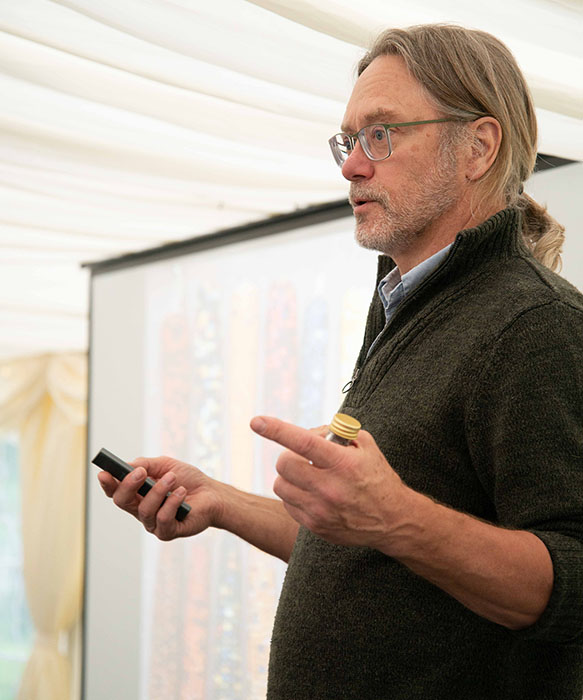
Formerly an academic and researcher in both Canada and the UK, Letts has been on a quest that led him away from conventional institutions to the thatched roofs of England in search of ancient seeds. His dedication saw him transition from academia to craftsmanship, becoming a thatcher to access seeds of rye and wheat preserved for centuries. Letts’ research is a literal and figurative dig into history, uncovering grains that reach up to six feet tall—akin to those depicted in late medieval art.
Dispensing with the typical practice of crop rotation, Letts instead fosters a ‘community of seeds’ that have evolved over 15 years. His approach encourages biodiversity and resilience, with the yield adapting to local conditions and developing resistance to disease and pests—standing in stark contrast to the monocultures that dominate UK agriculture today.
In addition to cultivating medieval varieties of wheat, barley, and rye, Letts is reviving the forgotten grain rivet and pursuing the growth of ‘real spelt,’ distinct from its modern counterpart. His insights into the ergot issue in medieval rye and the fermentation processes of traditional sourdough offer a glimpse into the intricate relationship between ancient practices and modern health concerns.
Recent support from an Oxford distillery has provided Letts with the means to further his research. The collaboration is a symbiotic one, with the distillery benefiting from diverse landrace grains to create fine spirits—attested by a sample of whisky lauded as the best by festival attendees—and Letts gaining the resources to expand his work, which includes supplying heritage grain flour to local bakeries for sourdough bread and pasta.
John Letts’ work embodies the spirit of innovation rooted in tradition, a fitting narrative for Pear Fest’s focus on sustainability, and a testament to the enduring relevance of ancient wisdom in contemporary agriculture.
Caldesi’s Culinary Revival: A Taste of Healthful Indulgence
At the heart of Pear Fest 2023, amid enlightening talks and pioneering practices, was a moment of culinary delight courtesy of Giancarlo and Katie Caldesi. Known for their string of acclaimed Italian eateries and a renowned cookery school in London, the Caldesis brought a personal touch to the festival’s lunch break. Following Giancarlo’s diabetes diagnosis, which led him on a transformative journey from pain and lethargy to vitality, the couple has turned to crafting books that champion healthy Italian cooking.
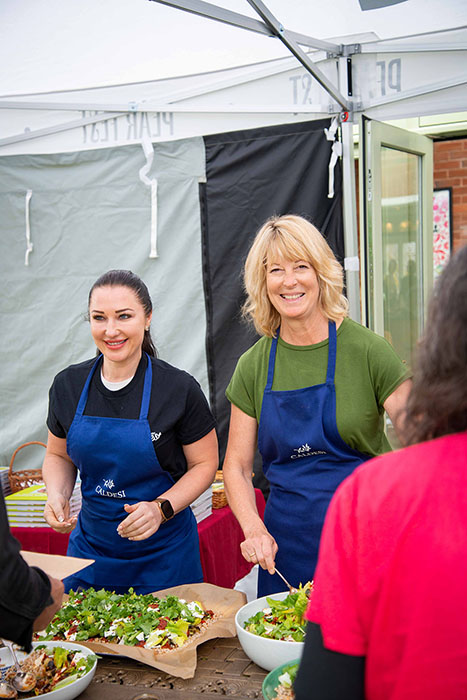
For Pear Fest, they crafted a memorable dish that embodied their philosophy: a sumptuous plate of Italian sausages with tenderly braised onions, served alongside a fresh, crisp salad. This dish, known in Italian as “Salsicce con Cipolle in Umido e Insalata,” proved that nutrition need not compromise flavour, but rather can enhance it, offering a taste experience that is both healthful and indulgent.
Hen Anderson: Cultivating Dreams and Biodiversity at Spindlebrook
The tale of transformation continued with Hen Anderson, co-founder of Spindlebrook Market Garden. Hen shared her journey of turning a neglected plot in Devon into a thriving example of regenerative agriculture, alongside her partner Elliot.
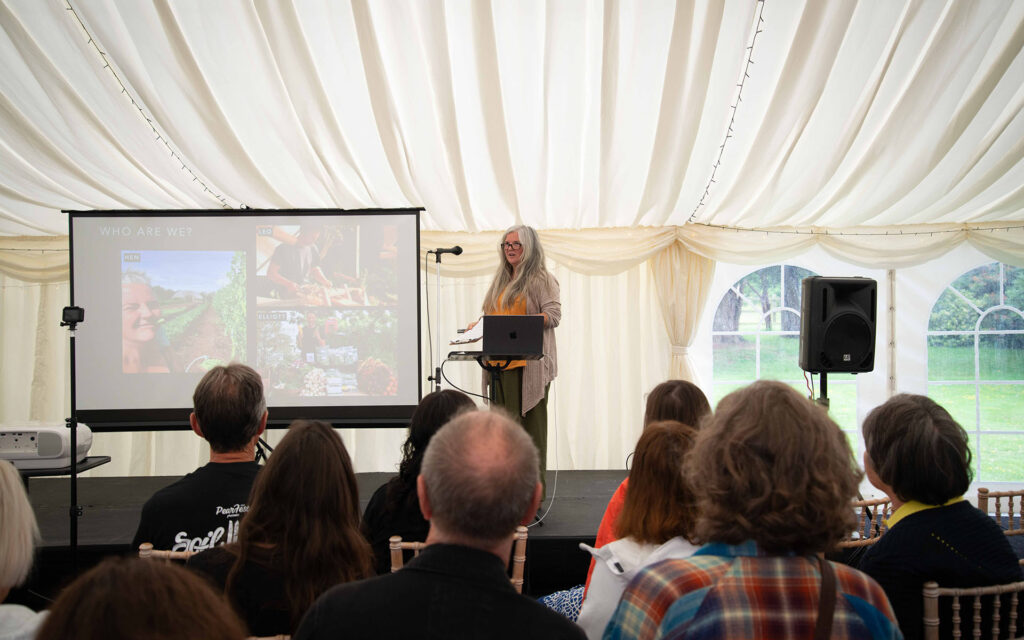
Their dream began with a caravan and a fallow piece of land, which they gave time to re-wild and rejuvenate while clearing the remnants left by previous owners. This initial period of restoration saw them recycle materials to mend greenhouses and innovate water irrigation systems, adhering to principles that honoured the land’s inherent structure.
Within just three years, Hen and Elliot’s dedication bore fruit, quite literally, as the soil’s biodiversity flourished anew. Each passing season marked the return of more wildlife; soil-dwelling insects, fluttering butterflies, and birds all re-established their presence, alongside the appearance of voles and badgers. Their planting technique—sowing seeds into compost mounds on existing field lanes—preserved the integrity of the soil, allowing plant roots to delve deeper in search of nutrients and further enhancing the land’s natural vitality.
At Spindlebrook, biodiversity is not just a goal but a method. Varied crop varieties within and across lanes create a tapestry of life, with hardwood chip-covered pathways aiding in the nourishment of soil fungi and their mycorrhizal networks.
The fruits of their labour have extended beyond the soil. Spindlebrook’s produce, celebrated for its quality at local farmers’ markets, has seen a rise in demand, enabling Hen and Elliot to transform an old stone edifice on their property into a beautiful home. Their success has also allowed them to share their knowledge with aspiring farmers, offering live-in educational experiences for students eager to learn the art of sustainable market gardening.
Hen Anderson’s story was not just one of personal fulfillment but a testament to the possibilities when we align our aspirations with ecological stewardship, a narrative of nurturing the earth to yield a harvest that nourishes and sustains.
Russ Carrington: Envisioning a Regenerative Horizon in Farming
At Pear Fest 2023, Russ Carrington, a regenerative farm manager, brought to light the impactful nexus between regenerative food and agriculture. He offered a message of optimism, noting the burgeoning interest in regenerative methods, as evidenced by the swelling numbers at the Groundswell Farming Festival.
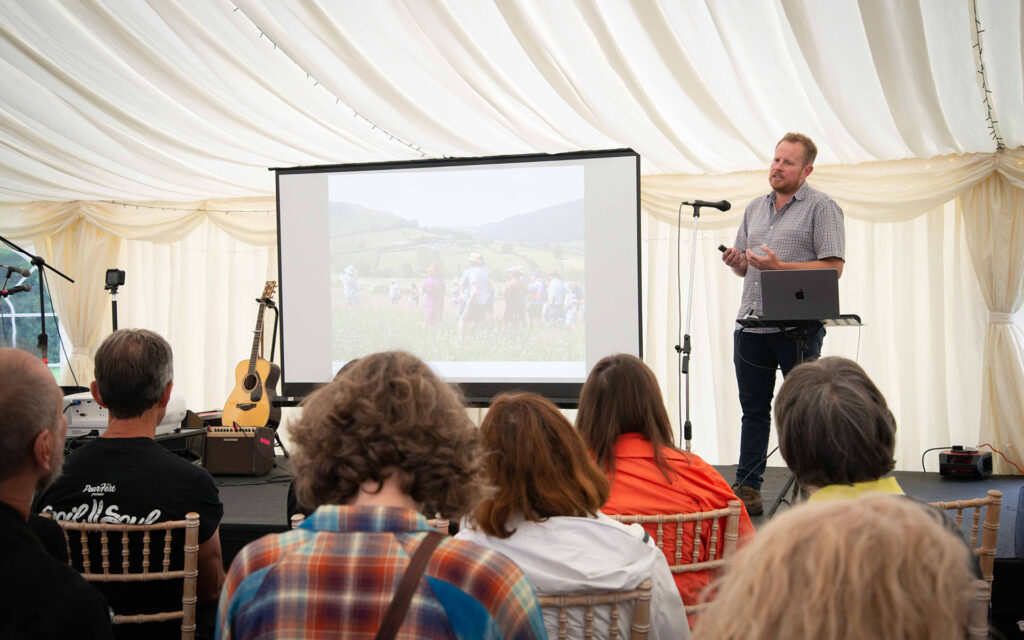
Carrington’s presentation, “Delivering Regenerative Food and Agriculture,” challenged popular misconceptions about traditional cattle rearing and its role in carbon cycling. Contrary to widespread belief, he explained how pasture-fed cows can be part of a beneficial carbon capture cycle that enriches the soil, supports plant growth, and contributes positively to the planet’s health. He dispelled myths around methane emissions from cattle, emphasizing that, in a balanced ecosystem, methane is broken down and the resulting CO2 is used by plants to enrich the soil further.
The discussion then turned to Carrington’s instrumental work in the re-wilding and development of regenerative farming at Knepp Estate, a 300-acre property in West Sussex known from Isabella Tree’s book “Wilding.” He outlined the three critical elements that have transformed Knepp from a struggling dairy farm into a vibrant nature reserve and productive regenerative farming land:
- Rewilding natural areas by allowing nature to self-restore, supplemented by selective human actions such as drainage, tree planting, and hedgerow restoration.
- Introducing small herds of native deer, cattle, and pigs to promote soil regeneration and biodiversity.
- Employing regenerative farming practices in adjacent fields, including crop cover during fallow periods and holistic planned grazing techniques.
Carrington elaborated on the practice of mob grazing, inspired by Allan Savory’s work, explaining how it involves short grazing periods on diverse pastures, adhering to a rule of thirds for optimal plant and soil health. This method, as well as the strategic movement of poultry following the herds, fosters a rich soil-to-table cycle that benefits the ecosystem and yields nutritious food.
Ecologists working with Carrington at Knepp have monitored species recovery and soil health, with indicators revealing a remarkable ecological revival since 2001. The estate now synchronously produces high-quality food for its thousands of visitors and the local community.
For consumers, the “Pasture for Life” certification assures that products meet stringent standards and originate from animals nourished on regenerative pastures throughout their lives.
Having recently moved on from Knepp, Carrington continues his mission as an advisor, extending his expertise to various UK regions and international projects. One such initiative involves guiding Romanian farmers and shepherds towards regenerative farming, demonstrating that maintaining biodiverse pastures is preferable to industrial farming practices.
Carrington’s insights underscored a crucial message: regenerative agriculture is not just a farming methodology; it’s a philosophy that holistically benefits the land, the community, and the planet.
Dr. David Unwin: A Visionary Approach to Diabetes and Regenerative Ecology
Dr. David Unwin, a Fellow of the Royal College of General Practitioners (FRCGP) and a renowned Clinical Expert in Diabetes, shared his groundbreaking work at Pear Fest 2023. His opening statement, “too much chemistry and not enough biology,” set the stage for a discussion that challenged conventional medical approaches to diabetes management.
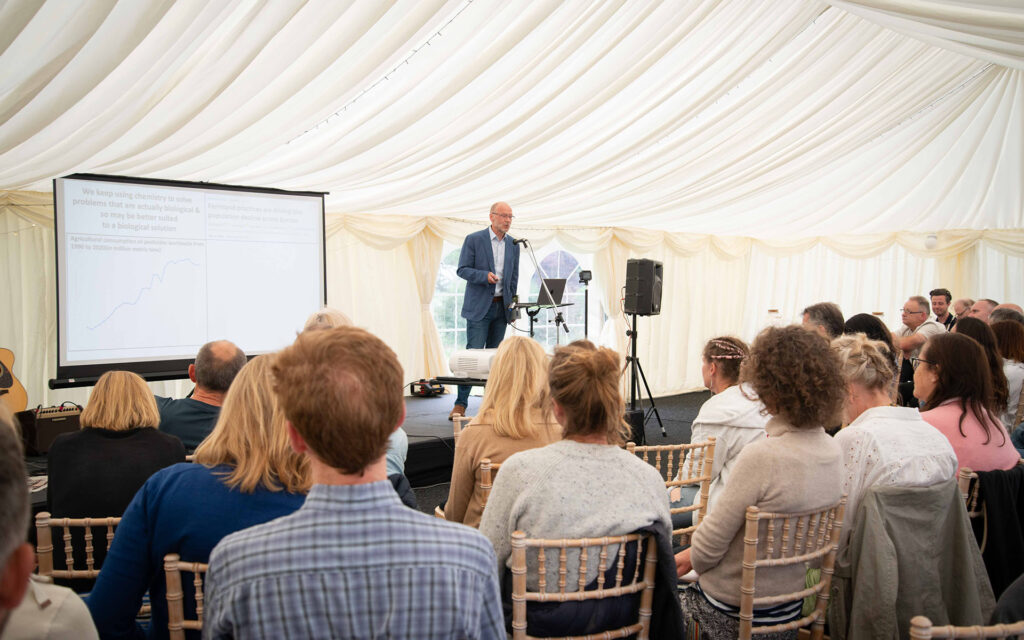
Dr. Unwin’s epiphany a decade ago questioned the sugar overload in diabetic patients’ bloodstreams. Eschewing the traditional adherence to NICE Guidelines, which emphasized pharmacology and low-fat diets, he turned his focus to reducing dietary sugars and starches with high glycaemic indices. This pivot led to remarkable success in his practice in Norwood, Southport, where he and his wife, Dr. Jen Unwin, a clinical psychologist specializing in addiction, ran nutritional advice classes that achieved staggering results. Their collaborative approach saw an unprecedented remission rate in Type 2 diabetes patients, reducing medication dependence and saving the practice a significant sum in annual drug expenditures.
Dr. Unwin’s contribution extended beyond his practice. He developed engaging Glycaemic Index (GCI) food charts and informative materials for use by GPs and practice nurses across the UK, available through the Public Health Collaboration. His efforts have turned the Norwood surgery into an international beacon for diabetes management, attracting global attention and visitors eager to learn from their success.
In his talk, Dr. Unwin bridged the gap between health and agriculture, highlighting the urgent need to shift food production towards regenerative methods that promote biodiversity and soil health without relying on harmful chemicals. He underscored the alarming statistic that sugar beet production in the UK, with its heavy dependence on pesticides and fertilizers, is responsible for a significant percentage of the country’s topsoil loss annually.
However, Dr. Unwin also offered hope through his involvement with The Three Owls Bird Sanctuary & Reserves. Here, a partnership with Marks and Spencer’s and the implementation of regenerative farming practices, including mob grazing, has transformed the land into a productive and vibrant ecosystem. The sanctuary now yields organic tomatoes, mutton, and beef while providing a haven for a diverse array of wildlife, including the cherished Barn Owls.
Dr. Unwin’s narrative at Pear Fest 2023 was one of innovation and optimism, demonstrating that a return to biology-based practices in both medicine and agriculture could foster healthier communities and ecosystems. His message was clear: by embracing regenerative principles, we can reverse the damage inflicted by conventional methods and move towards a more sustainable and healthful future.
Hattie Briggs: A Musical Epilogue to Day 1 of Pear Fest
As the enlightening discussions of Day 1 drew to a close at Pear Fest, Dr. David Jehring, our host, took to the stage with a promise of a special conclusion to the day’s events. The audience, already brimming with new insights on regenerative practices, was about to be treated to a soul-stirring musical experience by Pear Fest’s beloved artist, Hattie Briggs.
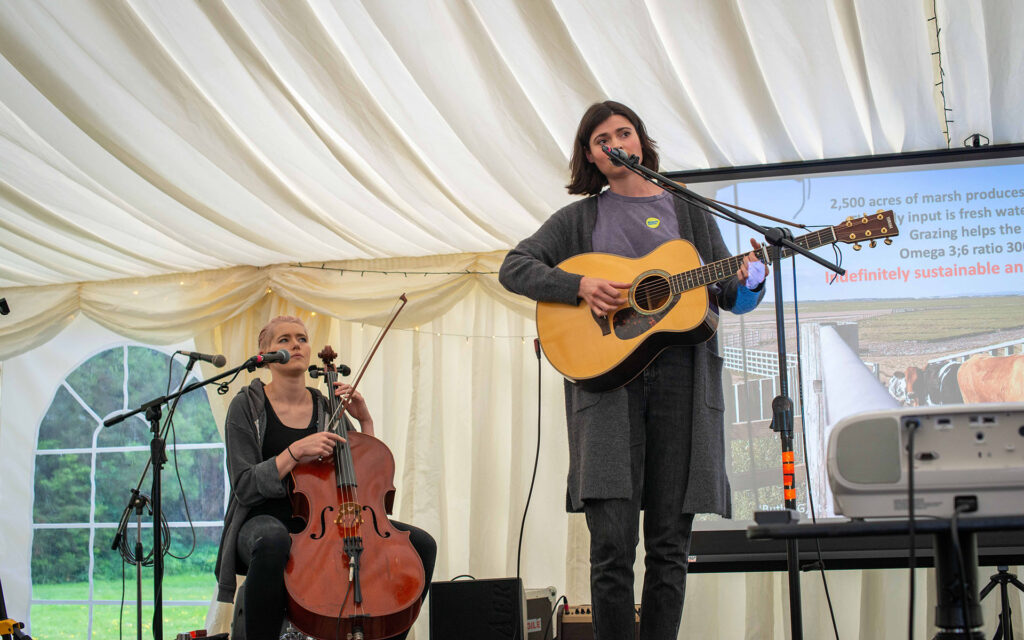
Hattie, an acclaimed singer-songwriter, had been commissioned to create a piece that encapsulated the essence of the festival’s spirit. Inspired by her conversations with Rebecca Hosking, Hattie had crafted a song that resonated with the themes of regeneration and harmony with nature. The song, titled ‘Wild: Learn off the land’, was a heartfelt tribute to the quiet wisdom of the earth and the delicate balance of its ecosystems.
With her bandmate Jas by her side, Hattie had arrived a day early at Pear Fest to perform this piece personally for Rebecca, whose work had kindled the flame of inspiration. Now, as they took the stage, the anticipation in the air was palpable.
The performance that ensued was nothing short of spellbinding. Hattie’s lyrical storytelling, woven with the tender melodies of her music, captivated the audience. Her words, “Stop right there and listen, learn off the land,” urged a moment of collective stillness, a chance to truly hear the whispers of the earth.
The song painted an auditory landscape as vivid and varied as the fields and forests it honoured. Each verse was a call to action, a reminder of our interconnectedness with nature and the shared responsibility to safeguard it. The refrain, “A world so tired, let it rest a while, return to wild,” was a powerful plea for restoration and respect.
As Hattie’s voice echoed through the venue, it connected the listeners with the very soul of Pear Fest’s mission. The emotional resonance of the performance left many in the audience visibly moved, a testament to the power of music to mirror and magnify the passions and purposes that had been discussed throughout the day.
The day concluded not with a closing statement, but with a song that continued to resonate in the hearts of those present, a melodic embodiment of the festival’s call to heed the land. It was a fitting and beautiful homage to the journey of learning, growth, and hope that Pear Fest promises each year.
DAY 2: The Music Festival
A Symphony of Flavours: Caldesis Serve Up Culinary Magic at Pear Fest
As the sun rose on the second day of Pear Fest, the air was tinged with the aroma of simmering herbs and fresh garden produce, thanks to the culinary prowess of Katie and Giancarlo Caldesi. The couple, renowned for their Italian flair and commitment to healthy eating, treated festival-goers to an intimate cookery demonstration, unveiling the secrets of an authentic Italian ragù.
In a display of gastronomic expertise, Giancarlo delved into the heart of Italian cooking, showing attendees how to coax out the rich, deep flavours from traditional Italian sausage meat, an array of organic vegetables, and a bouquet of fresh herbs. The secret, he revealed, lay in the art of slow cooking, a method that allows the ingredients’ nuances to meld and mature into a harmonious medley.
Meanwhile, Katie crafted a narrative of her own with a vibrant salad that was as much a feast for the eyes as for the palate. She assembled a kaleidoscopic array of leaves and edible flowers, each ingredient chosen not just for its taste but for the story it told. With a flourish, she presented the salad on a wooden board, transforming the dish into a living tapestry of Pear Fest’s ethos.
As the demonstration drew to a close, the audience was invited to experience the fruits of the Caldesis’ labour. The shared tasting session was more than just a sampling of dishes; it was an appreciation of a philosophy that champions local, organic produce and the joy of communal dining. The crowd’s reactions spoke volumes—they were not just satisfied but deeply moved by the Caldesis’ passion for food that truly nourishes both body and soul.
Remi Harris and Band Ignite Pear Fest with Blues and Rock Mastery
Remi Harris, a world-class jazz and blues guitarist and a firm favourite of the late Sean, in whose cherished memory Pear Fest is held, graced the stage to deliver his virtuosic sounds. We are fortunate to have such an esteemed musician as part of our local community, bringing his international acclaim right to our doorstep.
With his band in tow—featuring the soulful voice of Dave Small, the steadfast bass of Tom Moore, and the vibrant drumming of Shane Dixon—Remi was poised to take the audience on an auditory journey through the annals of blues music. The set promised a homage to the greats, from the evocative strains of Peter Green to the heavy riffs of rock legends like Black Sabbath, Deep Purple, and Led Zeppelin.
As the first chords struck, the crowd was immediately captivated. Remi and his band delivered a performance that was more than flawless—it was a celebration of musical legacy, each note a tribute to the icons they covered. The set left the audience spellbound, a fitting testament to the talent and passion that defines Pear Fest’s musical showcase.
Hattie Briggs: A Lyrical Journey at Pear Fest
The stage was alight with anticipation as Hattie Briggs, the gifted singer-songwriter, stepped up with her bandmates Jas and John for the next act of Pear Fest’s musical extravaganza. Known for her heartfelt lyrics and captivating melodies, Hattie was ready to enchant the festival audience with a selection of her most beloved songs.
As the set progressed, the connection between the trio and the audience grew deeper, with each song’s story resonating through the open air. Hattie’s voice, paired with the harmonious support of Jas and John, created an atmosphere of shared experience and reflection.
The climax of her performance came with a stirring rendition of ‘Wild: Learn off the Land’, a piece commissioned especially for Pear Fest. The song, which had moved many the day before, once again cast its spell, wrapping up Hattie’s set with a profound message that echoed the festival’s ethos of harmony with nature and mindfulness.
Hattie’s performance was a true highlight of the festival, leaving the audience not just entertained but touched by the power of music to mirror the beauty and call of the wild.
The Retros: Rocking Pear Fest with a ’70s Extravaganza
As the dusk settled and the last of the sourdough pizzas emerged from the wood-fired ovens, courtesy of Danni and her team, Pear Fest attendees gathered in eager anticipation for the grand finale. The Retros, back by popular demand after their show-stopping sixties performance the previous year, were primed to serve up a feast of ’70s hits.
True to the revolutionary spirit of the ’70s rock and roll era, The Retros delivered an electrifying two-hour set that had everyone on their feet from the start. Their expert renditions of classics from The Eagles to Led Zeppelin and Jeff Beck captured the very essence of the decade, with the melodies and rhythms that defined an era pulsing through the crowd.
The festival-goers were more than just spectators; they became a part of the vibrant tapestry of music and memory, dancing and singing along to each upbeat track. The Retros had once again proven their prowess in transporting audiences back in time through their music.
As the night reached its peak, The Retros brought Pear Fest to a rousing close with their brilliant rendition of ‘Hey Ho Silver Lining’. The familiar chords prompted a chorus of voices, as everyone joined in for the ultimate act of communal celebration. It was more than a performance; it was a shared experience that encapsulated the joyous, rebellious spirit of the ’70s, ensuring that Pear Fest ended on a high note that would resonate long after the music stopped.
Video summary
Relive the unforgettable moments of Pear Fest ’23 and immerse yourself in the memories with our video summary. Set against the hauntingly beautiful soundtrack of Hattie Briggs’s ‘Wild: Learn off the Land’, the video captures the essence of a weekend filled with enlightening talks, inspirational music, and a united community celebrating the harmony of agriculture, health, and nature. Experience the highlights here: Pear Fest ’23 Video Summary.
Pear Fest 24
Pear Fest 24 will take place on 21/22 June 2024, more information here. We look forward to seeing you all there.
